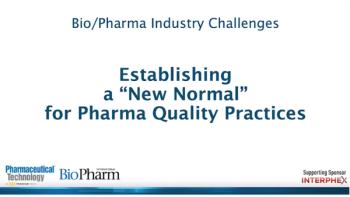
A growing pipeline of gene therapy candidates aimed at treating neurodegenerative diseases has prompted new guidance.


A growing pipeline of gene therapy candidates aimed at treating neurodegenerative diseases has prompted new guidance.

The agency’s focus appears to be on generic drugs for the upcoming year.

Connect with pharmaceutical and healthcare regulatory authorities around the world via this directory.


The guidance document provides recommendations for reporting and implementing changes to container closure system components consisting of glass vials and stoppers for sterile drug products.

Reviews of FDA initiatives and activities recapitulate efforts to assess and approve new drugs, generic drugs, and biologics and strategies for advancing new initiatives.

Auditing distribution suppliers provides understanding and documentation of the services performed.

To prevent future production delays of critical products, the Biden administration is examining supply chain vulnerabilities for pharmaceutical ingredients as part of a longer-range consideration of products important to public health.

Pharma companies find ways to maintain quality standards, despite pandemic-related restrictions.

FDA published guidance that includes risk-based recommendations for minimizing the potential transmission of COVID-19.

Clinical material for a Theratechnologies product in development will be produced at PPS’ manufacturing facility in Lexington, KY.

Since FDA authorization of two innovative mRNA vaccines to combat COVID-19 in late 2020, 30 million doses have been distributed, but only 4 million people were vaccinated in December 2020, and just 13 million have received shots so far.

As the Biden administration readies to take over the reigns of government, top administration officials continue to rush through new rules and decisions that appear to challenge the independence and effective operations of FDA.

The draft guidance document offers developers of these treatments information regarding product development, preclinical testing, and clinical trial design.

The European Commission has granted a conditional marketing authorization to Moderna for its COVID-19 vaccine.

The incoming administration faces key decisions on drug testing and access as well as vaccine distribution challenges.

Updating the quality technical agreement will clarify any expectations and limitations, says Siegfried Schmitt, vice president, Technical at Parexel.

President Trump signed the COVID-19 package, which appropriates $2.3 trillion to finance the federal government through September 2021 and provides support for individuals and entities suffering from the economic crisis wrought by the pandemic.

Success in combatting the pandemic depends on the ability of manufacturers to quickly and efficiently produce and distribute the huge quantities of vaccines demanded by the United States government and public health organizations around the world.

The European Medicines Agency (EMA) and the Heads of Medicines Agencies (HMA) have published a joint strategy for medicines regulation in Europe over the next five years.

The new guidance document is intended to minimize medication errors and avoid violations of the FD&C Act.

The European Pharmacopoeia is preparing for 2021 while also supporting the industry to develop vaccines and treatments for COVID-19.

Manufacturers and regulators accelerate R&D and production of new vaccines and therapies.

Virtual audits, virtual training, and more robust quality agreements may become positive impacts on the industry, says Susan J. Schniepp, distinguished fellow at Regulatory Compliance Associates.

The first public announcement from the Biden-Harris transition team was to name members of a COVID-19 advisory board charged with initiating policies and actions to combat the fast-rising infection rate in the United States.